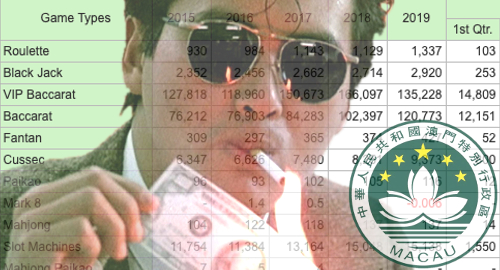 Macau casinos may have welcomed far fewer visitors in the first quarter of 2020 but mass market gaming revenue still managed to outpace its flashier VIP cousin.
Macau casinos may have welcomed far fewer visitors in the first quarter of 2020 but mass market gaming revenue still managed to outpace its flashier VIP cousin.
Figures released Thursday by Macau’s Gaming Inspection and Coordination Bureau (DICJ) show market-wide gaming revenue of just MOP30.6b (US$3.84b) in the three months ending March 31. That’s a 60% reduction from the same period last year and nearly as great a reduction from the final quarter of 2019.
VIP baccarat revenue totaled MOP14.8b, down from MOP32.3b in Q419, while mass market baccarat revenue fell to MOP12.15b from MOP30.7b. VIP baccarat’s share of the overall Q1 pie was 48.3%, up from 44.8% in Q419, but other mass market gaming options kept VIP from regaining the overall revenue crown.
Mass market gaming has now eclipsed VIP baccarat for five consecutive quarters, despite the dramatic drop-off in Q1 visitation sparked by the COVID-19 pandemic. Macau’s casinos were forced to close for 15 days in February and the market’s recovery has been painfully slow, to say the least.
Macau tourist arrivals during the Easter holiday were down 99.8% year-on-year, with the special administrative region reporting only 810 arrivals last weekend. Macau’s Public Security Police said average daily arrivals were below 300 last week, reflecting lingering concerns about further COVID-19 transmission as well as new travel restrictions imposed by China’s Guangdong province.
This week, Sanford C. Bernstein analysts projected April’s casino gaming revenue could fall as much as 95% year-on-year, as daily revenue averaged just MOP66m over the first two weeks of the month. A “very small number” of VIP gamblers continue to make the trek to Macau but the casinos have reportedly played unlucky in their dealings with these elusive high-rollers.
There’s a growing consensus among analysts that Macau’s recovery won’t truly begin until June at the earliest, and that’s assuming no second wave of infections is detected. The impact on Macau’s overall economy will be severe – the International Monetary Fund recently projected that Macau’s GDP could fall by 29.6% in 2020.